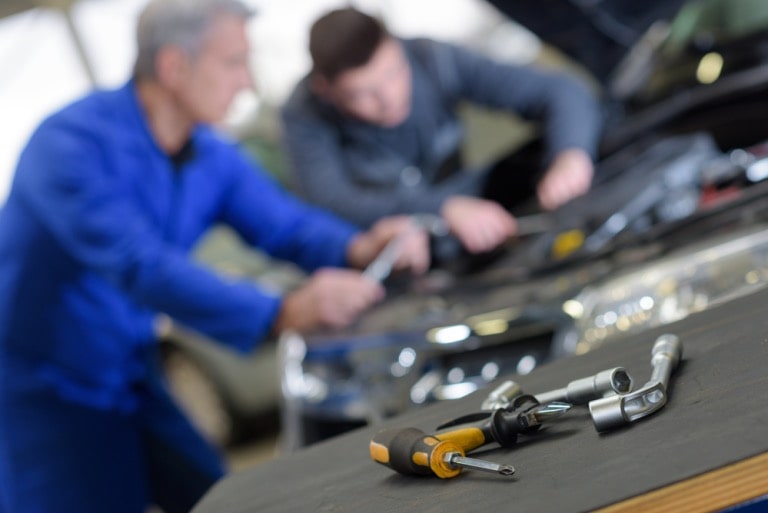Can You Safely Use Aftermarket Parts for Car Repairs?

Aftermarket parts are a common alternative to using Original Equipment Manufacturer (OEM) parts for car repairs. While OEM parts are made by the vehicle’s original manufacturer, aftermarket parts are produced by a range of independent companies.
In many cases, aftermarket parts are a less expensive alternative to OEM parts and may even have faster delivery windows. However, a crucial question arises: are aftermarket parts safe to use for your vehicle?
Understanding the Market for Replacement Car Parts
There are a vast number of aftermarket part manufacturers across the world. As a result, the quality of aftermarket parts can vary significantly, depending on which manufacturer you choose to purchase from. A reputable manufacturer with strict quality standards may provide parts on par with OEM replacements, but this is not always the case. Some manufacturers produce high-quality parts that meet rigorous industry standards, while others may prioritize lower costs over quality control. This variability underscores the importance of understanding the potential pros and cons of using aftermarket parts for your vehicle’s repair work.
In some cases, low-quality aftermarket parts can negatively impact your car’s performance. They may even be capable of causing additional problems, particularly if the aftermarket parts do not fit correctly into your vehicle or are installed incorrectly. Low-quality parts can make your vehicle dangerous to drive or even cause a crash, requiring you to bring in an experienced car accident attorney to protect your rights.
Quality Standards & Certifications
Reputable aftermarket parts manufacturers adhere to industry standards established by organizations like the Auto Care Association in the United States. These general standards ensure that parts meet criteria for durability, performance, and safety. Some aftermarket manufacturers go a step further and seek certifications from independent oversight agencies, further proving their commitment to quality repairs and client safety.
It is challenging to find comprehensive safety data comparing aftermarket and OEM parts. Even so, it is likely that high-quality aftermarket parts can be just as safe as their OEM counterparts, provided they are correctly fitted and installed.
The Advantages of Aftermarket Parts
While you may be on the fence between OEM and aftermarket parts, there are some undeniable advantages to going with the latter. To start, aftermarket parts are oftentimes much cheaper than OEM parts, especially if you’re repairing an older vehicle that you don’t want to splurge on. The affordability and range of aftermarket options can make repairs more accessible and help you manage maintenance costs for your vehicle.
Beyond cost, aftermarket parts offer you a lot more options to choose from for repairs. You may find a greater selection of aftermarket brake pads, for instance, including performance-oriented options that cater to specific driving styles. If you drive an older car that needs a specific part replaced, it can be challenging to find OEM parts if they have been discontinued by the original manufacturer. To get the correct OEM part can take time and a hefty sum of money. In this case, you might be able to find a comparable aftermarket part and get it shipped to you much more quickly than you could otherwise expect.
Potential Risks & Considerations for Aftermarket Parts
Despite the advantages, there are potential risks to consider before finalizing a purchase of aftermarket car parts. To begin with, you need to be absolutely certain that the replacement part is compatible with your vehicle. Aftermarket parts may not always perfectly match the specifications of your specific vehicle, which can decrease your vehicle’s performance or cause installation problems. Be sure to select an aftermarket part made by a reputable manufacturer that perfectly fits the specifications of your vehicle’s make and model.
You also need to carefully review your vehicle’s warranty manual. If your warranty terms require you to use OEM parts for repairs, failing to do so may void your car’s warranty or allow a manufacturer to refuse to provide repairs for damage caused by an incorrectly installed aftermarket part. You don’t want to accidentally compromise your vehicle’s coverage, so be sure to check the terms and conditions of your warranty very carefully!
Finally, you should take into account the potential impact on the longevity and reliability of aftermarket parts. High-quality aftermarket parts can be reliable and even as good as their OEM equivalents, but lower-quality parts may not offer the same lifespan or durability. You may find yourself facing frequent repairs or replacements down the line, which drives costs up and can potentially make aftermarket parts the less-affordable option.
Making an Informed Choice to Fit Your Needs
To ensure that aftermarket parts are safe for your vehicle, you’ll need to do your research and verify the quality of the components you want to buy. Before making a purchase, confirm that you’re buying from an established brand with a history of providing reliable auto parts. Online reviews and recommendations from trusted mechanics can help you confirm whether you ought to put your faith in a specific manufacturer.
In addition to reading online reviews, it’s wise to consult with a trusted mechanic or automotive professional. They can evaluate your repair needs, recommend suitable aftermarket replacements if applicable, and ensure that the parts are installed correctly.
At the end of the day, the decision to use aftermarket parts balances savings and safety considerations. For non-critical repairs on older vehicles, high-quality aftermarket parts can be a viable option. However, for safety-critical components or repairs on newer cars under warranty, OEM parts may be the ideal choice for your needs.
Informed Maintenance Will Keep Your Car Running Smoothly
Understanding the pros and cons of using aftermarket parts allows you to make an informed decision that will keep your car performing at a high level. As long as you find a reputable manufacturer, consult with a trusted mechanic, and weigh your options carefully, you can benefit from the savings of aftermarket parts without compromising your vehicle’s efficiency. We hope this article helps you stay safe on the road for many years to come!





